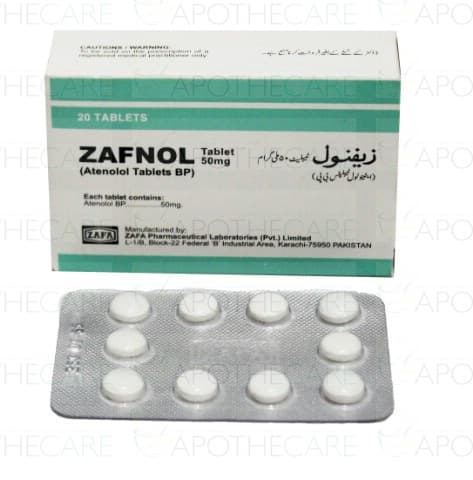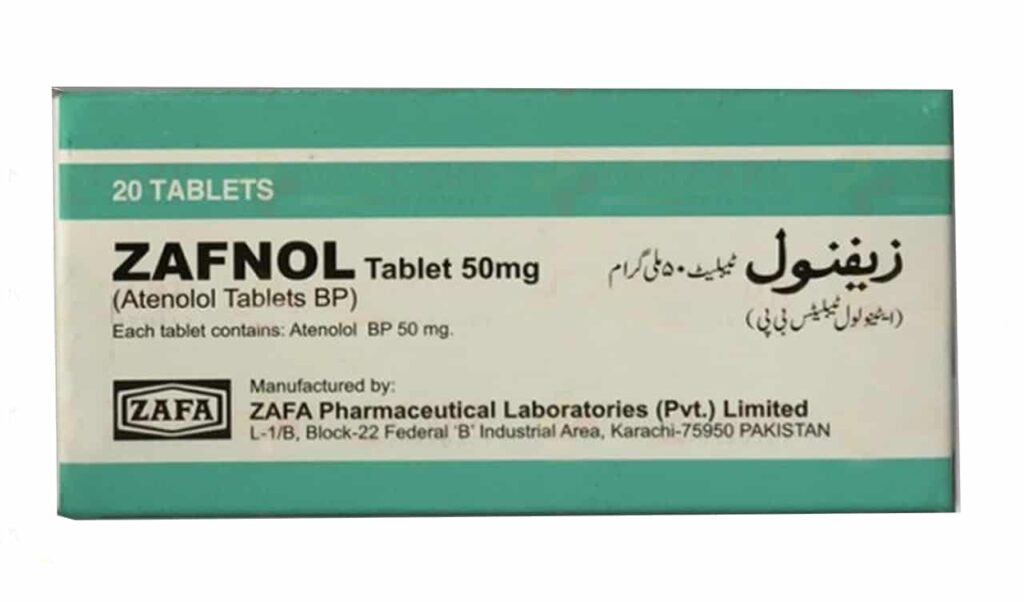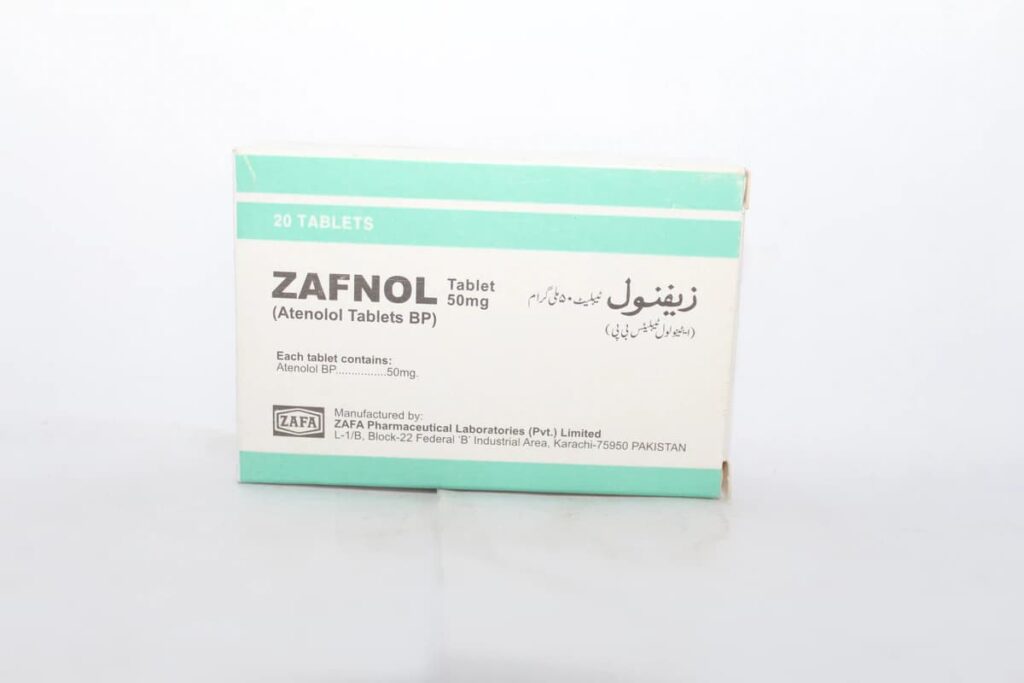Zafnol Tablets: Uses, Side Effects, Precautions & More
Zafnol is a drug whose active ingredient is atenolol, which is used to treat high blood pressure and irregular heartbeats (arrhythmia).
It may also be prescribed to treat chest pain from angina.
The use of this drug by high blood pressure patients helps prevent future heart diseases, heart attacks and strokes.
It is a drug produced in Pakistan.
Zafnol tablets are sometimes prescribed to prevent migraines and help with anxiety, but they are not officially approved to treat these diseases.
The drug is sold by prescription only.
This product is available in injection form, but this is usually administered by healthcare professionals in hospitals.
- Zafnol slows your heart rate and makes it easier for your heart to pump blood around your body.
- It may cause constipation, dizziness, sick or tired feeling or diarrhoea. These side effects are usually mild and disappear in a short time.
- You may experience dizziness the first time you take a Zafnol tablet, so it’s a good idea to take it at bedtime. If you experience dizziness while taking the medicine at night, drink it in the morning.
- Do not stop taking this medicine suddenly, especially if you have heart disease as this may worsen your condition.

What Will We Learn?
Who Can Use Zafnol Tablet?
Zafnol can be taken by adults.
In some cases, your doctor may prescribe this medicine for your child.
This medicine may not be suitable for everyone.
Contact your doctor before using the medicine if you have any of the conditions listed below to make sure it is safe for you:
- If you have ever had an allergic reaction to atenolol (the active ingredient in the medicine) or any other medicine
- Slow heartbeat or low blood pressure
- Serious circulation problems in the limbs (Raynaud’s phenomenon etc.) can cause your fingers and toes to tingle or turn pale or blue.
- Metabolic acidosis (too much acid in the blood)
- Lung disease or asthma
If you are pregnant or breastfeeding while using this medicine, contact your doctor.
How Is Zafnol Used?
You can usually take Zafnol once or twice a day.
If you experience dizziness when you start taking Zafnol, your doctor may recommend that you take your first dose at bedtime.
If you do not feel dizzy after the first dose, you can take your medicine in the morning.
If you’re taking Zafnol twice a day, you can usually take 1 dose in the morning and 1 dose in the evening.
It may be best to leave 10 to 12 hours between doses.
If you decide to stop taking the medicine, talk to your doctor.
This drug should be gradually tapered off over a few weeks in some patients.
How much of the medicine you take may vary depending on your illness.
Dosage for angina (chest pain): The standard dose is 100 mg once a day or 50 mg twice a day.
Dose for high blood pressure: The standard dose is 25 mg to 50 mg taken once a day.
Dose for irregular heartbeats (arrhythmia): The standard dose is 50 mg to 100 mg taken once a day.
Dose for migraine: the standard dose is 25 mg to 100 mg taken twice a day. In some cases, doctors may recommend this medication for migraine, but it has not been officially approved.
For children taking Zafnol tablets, your child’s doctor will calculate the correct dose using their weight and age.
Zafnol usually does not upset your stomach, so you can take it on an empty or full stomach.
Swallow this medicine whole with a glass of water without chewing.
If you have difficulty swallowing tablets, look for a score line on the medicine to divide the tablet in half.
If there is this score line, you can divide it into two and swallow it more easily with water.

Forgotten Dose
If you forget to take one of your Zafnol tablets, take it as soon as you remember, unless it’s time for your next dose.
Never take a double dose if it’s time for another dose.
Do not take extra zafnol to make up for a missed dose.
If you often forget doses, setting an alarm can help.
Overdose
The amount of Zafnol that can lead to an overdose varies from person to person.
If you take more than the prescribed dose, you may have trouble breathing and your heart rate may slow.
Also, an overdose can cause tremors and dizziness.
If you suspect that you have taken too much of a dose, go to the emergency room without waiting.
What Are The Side Effects Of Zafnol?
Like all medicines, Zafnol can cause side effects in some people, but many people experience no or only minor side effects.
Side effects may improve over time as your body gets used to this medicine.
The side effects listed below are mild side effects and their effect decreases over time.
Contact your doctor if these side effects do not go away and bother you:
- Feeling tired or sleepy
- Dizziness
- Cold fingers or toes
- Feeling sick (nausea)
- Diarrhea
- Constipation
The side effects listed below are very rare but can sometimes be life threatening.
If you experience any of the side effects listed below, go to the emergency room immediately:
- Shortness of breath with a cough that worsens when exercising (climbing stairs, running, etc.), swollen legs or ankles, chest pain or irregular heartbeat (these can be signs of heart problems)
- Shortness of breath, cold sweats, sharp, sudden chest pain that gets worse when you take a deep breath (these could be signs of lung problems)
- High temperature, fast heartbeat, shivering and confusion (these could be signs of a thyroid problem)
- A skin rash that may include blistered, itchy, red, swollen or peeling skin
- Wheezing
- Tightness in the throat or chest
- Difficulty speaking and breathing
- Swelling of throat, mouth, lips, tongue

Pregnancy And Breastfeeding
Atenolol, the active ingredient in Zafnol tablets, is generally not recommended during pregnancy.
Talk to your doctor about the benefits and possible harms of taking zafnol if you are pregnant, or are trying to become pregnant.
Your doctor can prescribe a safer medicine for you.
Labetalol is a safer medication for high blood pressure and is often prescribed by doctors.
If your doctor or health visitor says your baby is healthy, it’s okay to take Zafnol while you’re breastfeeding.
Atenolol, the active ingredient in Zafnol, passes into breast milk in small amounts and is unlikely to cause any side effects in your baby.
It is more important to treat your high blood pressure to keep you well.
Using this medicine in the right dosage while breastfeeding will benefit both you and your baby.
Talk to your doctor or healthcare provider if you notice a change in your baby, if he isn’t feeding as he used to, or if he seems unusually sleepy.
In such cases, your doctor may recommend different drug brands.
Other Drugs And Zafnol
There are some medications that can affect the way Zafnol works.
Tell your doctor if you are taking any of the medicines listed below:
- Medicines for high blood pressure: The combination with Zafnol can sometimes lower your blood pressure too much, causing you to feel dizzy or faint. In such cases, contact your doctor.
- Medicines for irregular heartbeat (amiodarone or flecainide etc.)
- Medications for chronic obstructive pulmonary disease (COPD) or asthma
- Colds Remedies
- Allergy drugs (ephedrine, noradrenaline, adrenaline, etc.)
Our article on dexabion injection used in allergic reactions may also draw your attention.
